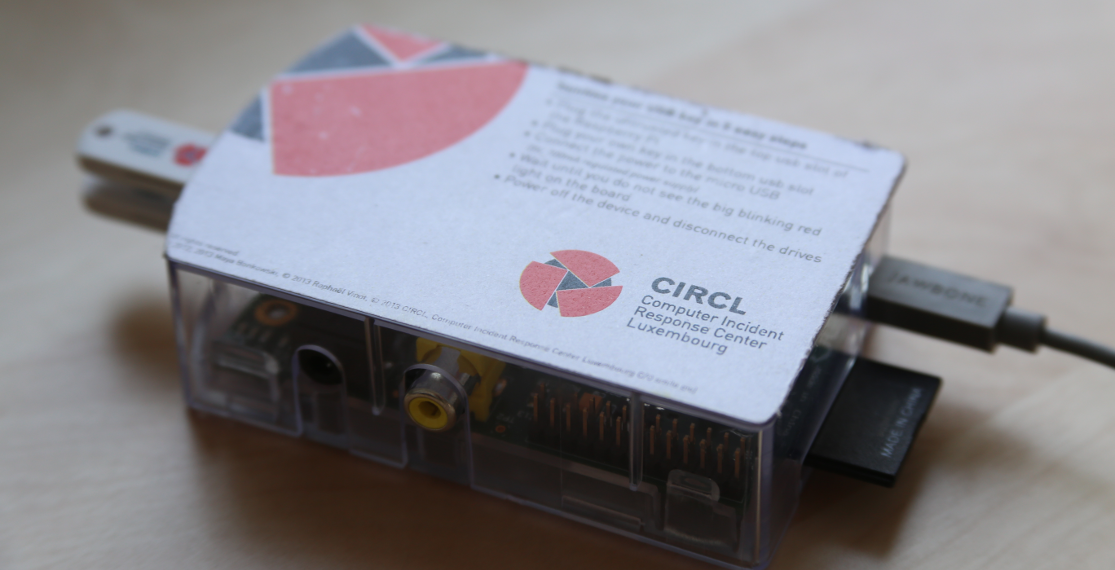mirror of https://github.com/CIRCL/Circlean
87 lines
3.6 KiB
Markdown
87 lines
3.6 KiB
Markdown
CIRCLean
|
|
========
|
|

|
|

|
|
|
|
How To
|
|
======
|
|
|
|
[Graphical how-to and pre-built image](http://circl.lu/projects/CIRCLean/).
|
|
|
|
To prepare the SD card on Windows, you can use [Win32DiskImager](http://sourceforge.net/projects/win32diskimager/).
|
|
|
|
And the linux way is in the command line, via dd (see in copy_to_final.sh)
|
|
|
|
If you'd like to contribute to the project or build the image yourself, see
|
|
[contributing](CONTRIBUTING.md) and the [setup readme](README_setup.md).
|
|
|
|
Why/What
|
|
========
|
|
|
|
This project aims to be useful when you get/find a USB key that you can't trust,
|
|
and you want to have a look at its contents without taking the risk of plugging it into your
|
|
main computer directly.
|
|
|
|
This is a work in progress - contributions are welcome:
|
|
|
|
The content of the first key will be copied or/and converted to the second key
|
|
following these rules (based on the mime type, as determined by libmagic):
|
|
- Direct copy of:
|
|
- Plain text files (mime type: text/*)
|
|
- Audio files (mime type: audio/*)
|
|
- Video files (mime type: video/*)
|
|
- Example files (mime type: example/*)
|
|
- Multipart files (mime type: multipart/*)
|
|
- *xml* files, after being converted to text files
|
|
- Octet-stream files
|
|
- Copied after verification:
|
|
- Image files after verifying that they are not compression bombs (mime type: image/*)
|
|
- PDF files, after marking as dangerous if they contain malicious content
|
|
- msword|vnd.openxmlformats-officedocument.*|vnd.ms-*|vnd.oasis.opendocument*, after
|
|
parsing with oletools/olefile and marking as dangerous if the parsing fails.
|
|
- Copied but marked as dangerous (DANGEROUS_filename_DANGEROUS)
|
|
- Message files (mime type: message/*)
|
|
- Model files (mime type: model/*)
|
|
- x-dosexec (executable)
|
|
- Compressed files (zip|x-rar|x-bzip2|x-lzip|x-lzma|x-lzop|x-xz|x-compress|x-gzip|x-tar|*compressed):
|
|
- Archives are unpacked, with the unpacking process stopped after 2 levels of archives
|
|
to prevent archive bombs.
|
|
- The above rules are applied recursively to the unpacked files.
|
|
|
|
Usage
|
|
=====
|
|
|
|
0. Power off the device and unplug all connections.
|
|
1. Plug the untrusted key in the top USB slot of the Raspberry Pi.
|
|
2. Plug your own key in the bottom USB slot (or use any of the other slots if
|
|
there are more than 2).
|
|
|
|
*Note*: This key should be bigger than the original one because any archives
|
|
present on the source key will be expanded and copied.
|
|
|
|
3. Optional: connect the HDMI cable to a screen to monitor the process.
|
|
4. Connect the power to the micro USB port.
|
|
|
|
*Note*: Use a 5V, 700mA+ regulated power supply
|
|
|
|
5. Wait until you do not see any blinking green light on the board, or if you
|
|
connected the HDMI cable, check the screen. The process is slow and can take
|
|
30-60 minutes depending on how many document conversions take place.
|
|
6. Power off the device and disconnect the drives.
|
|
|
|
Helper scripts
|
|
==============
|
|
|
|
You should use them as examples when you are creating a new image and probably not
|
|
run them blindly as you will most probably have to change parameters accordingly to
|
|
your configuration.
|
|
|
|
IN ALL CASES, PLEASE READ THE COMMENTS IN THE SCRIPTS AT LEAST ONCE.
|
|
|
|
* proper_chroot.sh: uses qemu to chroot into a raspbian instance (.img or SD Card)
|
|
* prepare_rPI.sh: update the system, some configuration
|
|
* create_user.sh: create the user who will run the scripts, assign the proper sudo rights.
|
|
* copy_to_final.sh: populate the content of the directory fs/ in the image,
|
|
contains a sample of dd command to write the image on the SD card.
|
|
NOTE: TAKE CARE NOT TO USE THE WRONG DESTINATION
|